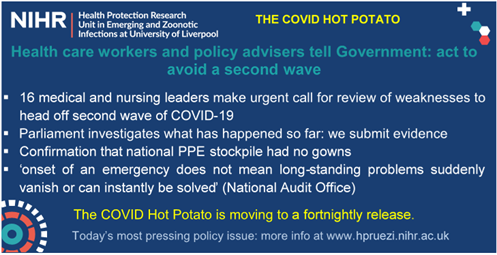The COVID Hot Potato 9
Thu, 25 June 2020

This week the hottest ‘hot potato’ is the open letter in the British Medical Journal from the Presidents of Royal Colleges calling for a rapid review of preparations for a second wave of COVID-19, and a focus on areas of weakness where action is needed to prevent further loss of life.[1] As the political temperature rises, this week we look at Parliament’s scrutiny of the government’s actions.[2] The National Audit Office (NAO), which reports to the House of Commons’ influential Public Accounts Committee (PAC), has published two reports already.[3] Government Departments fear the PAC, which pulls no punches: now it is investigating the government’s early 2020 preparations for the COVID-19 peak. They are taking oral and written evidence: we sent in an HPRU-EZI contribution. Much of the Committee’s evidence will be published on its website – unredacted – in coming weeks.
The NAO confirms that the UK’s PPE stockpile contained no gowns, despite official scientific advice to acquire them.[4] As Cabinet Office Minister Michael Gove told Parliament this April, the stockpile was ‘explicitly for a flu pandemic’.[5] Since aprons are judged sufficient for flu, that meant it lacked the gowns judged essential for coronavirus outbreaks. The report drily notes, ‘the Department told us the procurement of gowns was planned for early 2020.’ Elsewhere, this Report notes that ‘since 2010-11 … [a]dditional funding for health and social care has at times been used to address immediate needs rather than to increase the long-term sustainability of services.’[6] Delaying the ordering of gowns was one such decision.
The NAO note too that ‘the onset of an emergency does not mean … long-standing problems suddenly vanish or can instantly be solved.’[7] Our own interviews with health care workers and policy advisers indicate that one such long-standing problem was the limited ‘surge’ capacity for virus testing in PHE and NHS labs. We are all well aware this ‘could not instantly be solved’.
On Monday 22 June, the Public Accounts Committee took oral evidence from top officials at DHSC, NHS England and PHE. It made interesting viewing: at one point DHSC’s Permanent Secretary, Chris Wormald, told MPs that the decision in March to discharge patients with COVID-19 to care homes was right on the available evidence but he would not necessarily make the same choice another time.[8] One has to sympathise – facing a novel virus – with government arguments that we know far more today than we did in March: such is the nature of science.
_____________________________
NOTE: The NIHR Health Protection Research Unit in Emerging and Zoonotic Infections brings together internationally leading researchers from the University of Liverpool, University of Oxford, Liverpool School of Tropical Medicine, and Public Health England.
We are conducting an MRC-Funded project to understand the dynamics of policy development and healthcare professionals’ behaviour in the UK during the COVID-19 pandemic. We have a targeted panel of healthcare professionals, with whom we regularly speak, to capture their experiences and reactions over the course of the outbreak. They include clinical leads, junior doctors, and nurses in HCID units, Emergency departments, intensive therapy units, medical wards, neonatal units and GP surgeries.
We have previously identified emerging issues around PPE challenges, the need for testing of healthcare professionals, and the need for mental health support for staff on the frontline, all of which were fed back to Government Advisory Panels, and proved to be important in decision-making.
If you’d like to contact the HPRU EZI, you can email hpruezi@liverpool.ac.uk or call 0151 795 9626.
[2] https://www.parliament.uk/covid19-researcher-engagement describes this work.
[4] National Audit Office, Readying the NHS and adult social care in England for COVID-19 (HC 367, London: National Audit Office, 10 June 2020), p. 58. Available here.
[5] House of Commons Hansard 28 April 2020, col. 220.
[6] National Audit Office, Readying the NHS,p. 5.
[7] Same source and page.
